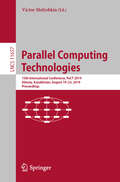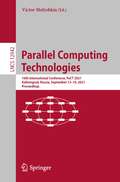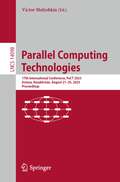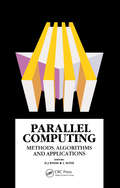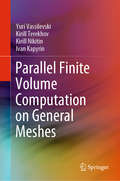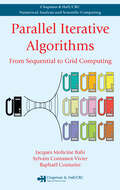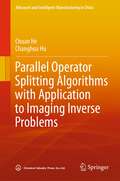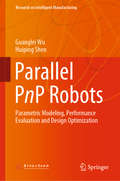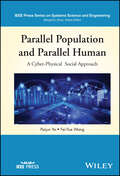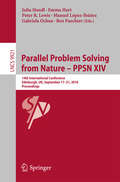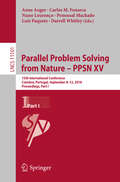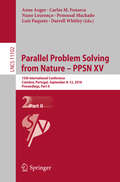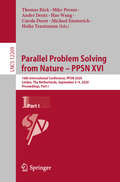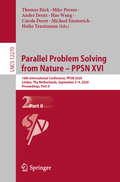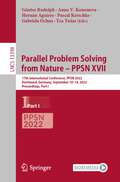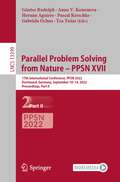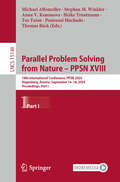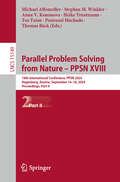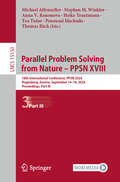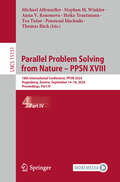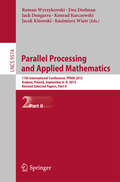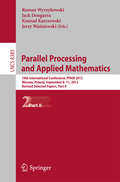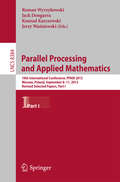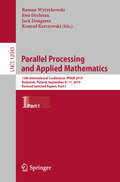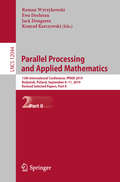- Table View
- List View
Parallel Computing Technologies: 15th International Conference, PaCT 2019, Almaty, Kazakhstan, August 19–23, 2019, Proceedings (Lecture Notes in Computer Science #11657)
by Victor MalyshkinThis book constitutes the proceedings of the 15th International Conference on Parallel Computing Technologies, PaCT 2019, held in Almaty, Kazakhstan, in August 2019. The 24 full papers and 10 short papers presented were carefully reviewed and selected from 72 submissions. The papers are organized in topical sections on Programming Languages and Execution Environments; Methods and Tools for Parallel Solution of Large-Scale Problems; Data Processing; Cellular Automata; and Distributed Algorithms.
Parallel Computing Technologies: 16th International Conference, PaCT 2021, Kaliningrad, Russia, September 13–18, 2021, Proceedings (Lecture Notes in Computer Science #12942)
by Victor MalyshkinThis book constitutes the proceedings of the 16th International Conference on Parallel Computing Technologies, PaCT 2021, which was held during September 13-18, 2021. The conference was planned to take place in Kaliningrad, Russia, but changed to an online event due to the COVID-19 pandemic. The 24 full and 12 short papers included in this book were carefully reviewed and selected from 62 submissions. They were organized in topical sections as follows: parallel programming methods and tools; applications; memory-efficient data structures; experimental studies; job management; essential algorithms; computing services; and cellular automata.
Parallel Computing Technologies: 17th International Conference, PaCT 2023, Astana, Kazakhstan, August 21–25, 2023, Proceedings (Lecture Notes in Computer Science #14098)
by Victor MalyshkinThis book constitutes the refereed proceedings of the 17th International Conference on Parallel Computing Technologies, PaCT 2023, held in Astana, Kazakhstan, during August 21-25, 2023. The 15 full papers included in this book were carefully reviewed and selected from 23 submissions. They were organized in topical sections as follows: automatic programming and program tuning; frameworks and services; algorithms; and distributed systems management.
Parallel Computing: Methods, Algorithms and Applications
by David J Evans; C SuttiParallel Computing: Methods, Algorithms and Applications presents a collection of original papers presented at the international meeting on parallel processing, methods, algorithms, and applications at Verona, Italy in September 1989.
Parallel Finite Volume Computation on General Meshes
by Yuri Vassilevski Kirill Terekhov Kirill Nikitin Ivan KapyrinThis book presents a systematic methodology for the development of parallel multi-physics models and its implementation in geophysical and biomedical applications. The methodology includes conservative discretization methods for partial differential equations on general meshes, as well as data structures and algorithms for organizing parallel simulations on general meshes. The structures and algorithms form the core of the INMOST (Integrated Numerical Modelling Object-oriented Supercomputing Technologies) platform for the development of parallel models on general meshes. The authors consider applications for addressing specific geophysical and biomedical challenges, including radioactive contaminant propagation with subsurface waters, reservoir simulation, and clot formation in blood flows. The book gathers all the components of this methodology, from algorithms and numerical methods to the open-source software, as well as examples of practical applications, in a single source, making it a valuable asset for applied mathematicians, computer scientists, and engineers alike.
Parallel Iterative Algorithms: From Sequential to Grid Computing
by Jacques Mohcine Bahi Sylvain Contassot-Vivier Raphael CouturierFocusing on grid computing and asynchronism, Parallel Iterative Algorithms explores the theoretical and practical aspects of parallel numerical algorithms. Each chapter contains a theoretical discussion of the topic, an algorithmic section that fully details implementation examples and specific algorithms, and an evaluation of the advantages and dr
Parallel Operator Splitting Algorithms with Application to Imaging Inverse Problems (Advanced and Intelligent Manufacturing in China)
by Chuan He Changhua HuImage denoising, image deblurring, image inpainting, super-resolution, and compressed sensing reconstruction have important application value in engineering practice, and they are also the hot frontiers in the field of image processing. This book focuses on the numerical analysis of ill condition of imaging inverse problems and the methods of solving imaging inverse problems based on operator splitting. Both algorithmic theory and numerical experiments have been addressed. The book is divided into six chapters, including preparatory knowledge, ill-condition numerical analysis and regularization method of imaging inverse problems, adaptive regularization parameter estimation, and parallel solution methods of imaging inverse problem based on operator splitting. Although the research methods in this book take image denoising, deblurring, inpainting, and compressed sensing reconstruction as examples, they can also be extended to image processing problems such as image segmentation, hyperspectral decomposition, and image compression. This book can benefit teachers and graduate students in colleges and universities, or be used as a reference for self-study or further study of image processing technology engineers.
Parallel PnP Robots: Parametric Modeling, Performance Evaluation and Design Optimization (Research on Intelligent Manufacturing)
by Huiping Shen Guanglei WuThis book discusses the parametric modeling, performance evaluation, design optimization and comparative study of the high-speed, parallel pick-and-place robots. It collects the modeling methodology, evaluation criteria and design guidelines for parallel PnP robots to provide a systematic analysis method for robotic developers. Furthermore, it gathers the research results previously scattered in many prestigious international journals and conference proceedings and methodically edits them and presents them in a unified form. The book is of interest to researchers, R&D engineers and graduate students in industrial parallel robotics who wish to learn the core principles, methods, algorithms, and applications.
Parallel Population and Parallel Human: A Cyber-Physical Social Approach (IEEE Press Series on Systems Science and Engineering)
by Fei-Yue Wang Peijun YeParallel Population and Parallel Human Proposes a new paradigm to investigate an individual’s cognitive deliberation in dynamic human-machine interactions Today, intelligent machines enable people to interact remotely with friends, family, romantic partners, colleagues, competitors, organizations, and others. Virtual reality (VR), augmented reality (AR), artificial intelligence (AI), mobile social media, and other technologies have been driving these interactions to an unprecedented level. As the complexity in system control and management with human participants increases, engineers are facing challenges that arise from the uncertainty of operators or users. Parallel Population and Parallel Human: A Cyber-Physical Social Approach presents systemic solutions for modeling, analysis, computation, and management of individuals’ cognition and decision-making in human-participated systems, such as the MetaVerse. With a virtual-real behavioral approach that seeks to actively prescribe user behavior through cognitive and dynamic learning, the authors present a parallel population/human model for optimal prescriptive control and management of complex systems that leverages recent advances in artificial intelligence. Throughout the book, the authors address basic theory and methodology for modeling, describe various implementation techniques, highlight potential acceleration technologies, discuss application cases from different fields, and more. In addition, the text: Considers how an individual’s behavior is formed and how to prescribe their behavioral modes Describes agent-based computation for complex social systems based on a synthetic population from realistic individual groups Proposes a universal algorithm applicable to a wide range of social organization types Extends traditional cognitive modeling by utilizing a dynamic approach to investigate cognitive deliberation in highly time-variant tasks Presents a new method that can be used for both large-scale social systems and real-time human-machine interactions without extensive experiments for modeling Parallel Population and Parallel Human: A Cyber-Physical Social Approach is a must-read for researchers, engineers, scientists, professionals, and graduate students who work on systems engineering, human-machine interaction, cognitive computing, and artificial intelligence.
Parallel Problem Solving from Nature – PPSN XIV
by Emma Hart Gabriela Ochoa Manuel López-Ibáñez Julia Handl Peter R. Lewis Ben PaechterThis book constitutes the refereed proceedings of the 14th International Conference on Parallel Problem Solving from Nature, PPSN 2016, held in Edinburgh, UK, in September 2016. The total of 93 revised full papers were carefully reviewed and selected from 224 submissions. The meeting began with four workshops which offered an ideal opportunity to explore specific topics in intelligent transportation Workshop, landscape-aware heuristic search, natural computing in scheduling and timetabling, and advances in multi-modal optimization. PPSN XIV also included sixteen free tutorials to give us all the opportunity to learn about new aspects: gray box optimization in theory; theory of evolutionary computation; graph-based and cartesian genetic programming; theory of parallel evolutionary algorithms; promoting diversity in evolutionary optimization: why and how; evolutionary multi-objective optimization; intelligent systems for smart cities; advances on multi-modal optimization; evolutionary computation in cryptography; evolutionary robotics - a practical guide to experiment with real hardware; evolutionary algorithms and hyper-heuristics; a bridge between optimization over manifolds and evolutionary computation; implementing evolutionary algorithms in the cloud; the attainment function approach to performance evaluation in EMO; runtime analysis of evolutionary algorithms: basic introduction; meta-model assisted (evolutionary) optimization. The papers are organized in topical sections on adaption, self-adaption and parameter tuning; differential evolution and swarm intelligence; dynamic, uncertain and constrained environments; genetic programming; multi-objective, many-objective and multi-level optimization; parallel algorithms and hardware issues; real-word applications and modeling; theory; diversity and landscape analysis.
Parallel Problem Solving from Nature – PPSN XV: 15th International Conference, Coimbra, Portugal, September 8–12, 2018, Proceedings, Part I (Lecture Notes in Computer Science #11101)
by Nuno Lourenço Penousal Machado Anne Auger Carlos M. Fonseca Luís Paquete Darrell WhitleyThis two-volume set LNCS 11101 and 11102 constitutes the refereed proceedings of the 15th International Conference on Parallel Problem Solving from Nature, PPSN 2018, held in Coimbra, Portugal, in September 2018. The 79 revised full papers were carefully reviewed and selected from 205 submissions. The papers cover a wide range of topics in natural computing including evolutionary computation, artificial neural networks, artificial life, swarm intelligence, artificial immune systems, self-organizing systems, emergent behavior, molecular computing, evolutionary robotics, evolvable hardware, parallel implementations and applications to real-world problems. The papers are organized in the following topical sections: numerical optimization; combinatorial optimization; genetic programming; multi-objective optimization; parallel and distributed frameworks; runtime analysis and approximation results; fitness landscape modeling and analysis; algorithm configuration, selection, and benchmarking; machine learning and evolutionary algorithms; and applications. Also included are the descriptions of 23 tutorials and 6 workshops which took place in the framework of PPSN XV.
Parallel Problem Solving from Nature – PPSN XV: 15th International Conference, Coimbra, Portugal, September 8–12, 2018, Proceedings, Part II (Lecture Notes in Computer Science #11102)
by Nuno Lourenço Penousal Machado Anne Auger Carlos M. Fonseca Luís Paquete Darrell WhitleyThis two-volume set LNCS 11101 and 11102 constitutes the refereed proceedings of the 15th International Conference on Parallel Problem Solving from Nature, PPSN 2018, held in Coimbra, Portugal, in September 2018. The 79 revised full papers were carefully reviewed and selected from 205 submissions. The papers cover a wide range of topics in natural computing including evolutionary computation, artificial neural networks, artificial life, swarm intelligence, artificial immune systems, self-organizing systems, emergent behavior, molecular computing, evolutionary robotics, evolvable hardware, parallel implementations and applications to real-world problems. The papers are organized in the following topical sections: numerical optimization; combinatorial optimization; genetic programming; multi-objective optimization; parallel and distributed frameworks; runtime analysis and approximation results; fitness landscape modeling and analysis; algorithm configuration, selection, and benchmarking; machine learning and evolutionary algorithms; and applications. Also included are the descriptions of 23 tutorials and 6 workshops which took place in the framework of PPSN XV.
Parallel Problem Solving from Nature – PPSN XVI: 16th International Conference, PPSN 2020, Leiden, The Netherlands, September 5-9, 2020, Proceedings, Part I (Lecture Notes in Computer Science #12269)
by Michael Emmerich Thomas Bäck Hao Wang Heike Trautmann André Deutz Mike Preuss Carola DoerrThis two-volume set LNCS 12269 and LNCS 12270 constitutes the refereed proceedings of the 16th International Conference on Parallel Problem Solving from Nature, PPSN 2020, held in Leiden, The Netherlands, in September 2020. The 99 revised full papers were carefully reviewed and selected from 268 submissions. The topics cover classical subjects such as automated algorithm selection and configuration; Bayesian- and surrogate-assisted optimization; benchmarking and performance measures; combinatorial optimization; connection between nature-inspired optimization and artificial intelligence; genetic and evolutionary algorithms; genetic programming; landscape analysis; multiobjective optimization; real-world applications; reinforcement learning; and theoretical aspects of nature-inspired optimization.
Parallel Problem Solving from Nature – PPSN XVI: 16th International Conference, PPSN 2020, Leiden, The Netherlands, September 5-9, 2020, Proceedings, Part II (Lecture Notes in Computer Science #12270)
by Michael Emmerich Thomas Bäck Hao Wang Heike Trautmann André Deutz Mike Preuss Carola DoerrThis two-volume set LNCS 12269 and LNCS 12270 constitutes the refereed proceedings of the 16th International Conference on Parallel Problem Solving from Nature, PPSN 2020, held in Leiden, The Netherlands, in September 2020. The 99 revised full papers were carefully reviewed and selected from 268 submissions. The topics cover classical subjects such as automated algorithm selection and configuration; Bayesian- and surrogate-assisted optimization; benchmarking and performance measures; combinatorial optimization; connection between nature-inspired optimization and artificial intelligence; genetic and evolutionary algorithms; genetic programming; landscape analysis; multiobjective optimization; real-world applications; reinforcement learning; and theoretical aspects of nature-inspired optimization.
Parallel Problem Solving from Nature – PPSN XVII: 17th International Conference, PPSN 2022, Dortmund, Germany, September 10–14, 2022, Proceedings, Part I (Lecture Notes in Computer Science #13398)
by Gabriela Ochoa Günter Rudolph Anna V. Kononova Hernán Aguirre Pascal Kerschke Tea TušarThis two-volume set LNCS 13398 and LNCS 13399 constitutes the refereed proceedings of the 17th International Conference on Parallel Problem Solving from Nature, PPSN 2022, held in Dortmund, Germany, in September 2022.The 87 revised full papers were carefully reviewed and selected from numerous submissions. The conference presents a study of computing methods derived from natural models. Amorphous Computing, Artificial Life, Artificial Ant Systems, Artificial Immune Systems, Artificial Neural Networks, Cellular Automata, Evolutionary Computation, Swarm Computing, Self-Organizing Systems, Chemical Computation, Molecular Computation, Quantum Computation, Machine Learning, and Artificial Intelligence approaches using Natural Computing methods are just some of the topics covered in this field.
Parallel Problem Solving from Nature – PPSN XVII: 17th International Conference, PPSN 2022, Dortmund, Germany, September 10–14, 2022, Proceedings, Part II (Lecture Notes in Computer Science #13399)
by Gabriela Ochoa Günter Rudolph Anna V. Kononova Hernán Aguirre Pascal Kerschke Tea TušarThis two-volume set LNCS 13398 and LNCS 13399 constitutes the refereed proceedings of the 17th International Conference on Parallel Problem Solving from Nature, PPSN 2022, held in Dortmund, Germany, in September 2022.The 87 revised full papers were carefully reviewed and selected from numerous submissions. The conference presents a study of computing methods derived from natural models. Amorphous Computing, Artificial Life, Artificial Ant Systems, Artificial Immune Systems, Artificial Neural Networks, Cellular Automata, Evolutionary Computation, Swarm Computing, Self-Organizing Systems, Chemical Computation, Molecular Computation, Quantum Computation, Machine Learning, and Artificial Intelligence approaches using Natural Computing methods are just some of the topics covered in this field.
Parallel Problem Solving from Nature – PPSN XVIII: 18th International Conference, PPSN 2024, Hagenberg, Austria, September 14–18, 2024, Proceedings, Part I (Lecture Notes in Computer Science #15148)
by Thomas Bäck Penousal Machado Heike Trautmann Anna V. Kononova Tea Tušar Michael Affenzeller Stephan M. WinklerThis multi-volume LNCS set, LNCS 15148-15151, constitutes the refereed proceedings of the 18th International Conference on Parallel Problem Solving from Nature, PPSN 2024, held in Hagenberg, Austria, in September 2024. The 101 full papers presented in these proceedings were carefully reviewed and selected from 294 submissions. The papers presented in these four volumes are organized in the following topical sections: Part I: Combinatorial Optimization; Genetic Programming; Fitness Landscape Modeling and Analysis. Part II: Benchmarking and Performance Measures; Automated Algorithm Selection and Configuration; Numerical Optimization; Bayesian- and Surrogate-Assisted Optimization. Part III: Theoretical Aspects of Nature-Inspired Optimization; (Evolutionary) Machine Learning and Neuroevolution; Evolvable Hardware and Evolutionary Robotics. Part IV: Multi-Objective Optimization; Real-World Applications.
Parallel Problem Solving from Nature – PPSN XVIII: 18th International Conference, PPSN 2024, Hagenberg, Austria, September 14–18, 2024, Proceedings, Part II (Lecture Notes in Computer Science #15149)
by Thomas Bäck Penousal Machado Heike Trautmann Anna V. Kononova Tea Tušar Michael Affenzeller Stephan M. WinklerThis multi-volume LNCS set, LNCS 15148-15151, constitutes the refereed proceedings of the 18th International Conference on Parallel Problem Solving from Nature, PPSN 2024, held in Hagenberg, Austria, in September 2024. The 101 full papers presented in these proceedings were carefully reviewed and selected from 294 submissions. The papers presented in these four volumes are organized in the following topical sections: Part I: Combinatorial Optimization; Genetic Programming; Fitness Landscape Modeling and Analysis. Part II: Benchmarking and Performance Measures; Automated Algorithm Selection and Configuration; Numerical Optimization; Bayesian- and Surrogate-Assisted Optimization. Part III: Theoretical Aspects of Nature-Inspired Optimization; (Evolutionary) Machine Learning and Neuroevolution; Evolvable Hardware and Evolutionary Robotics. Part IV: Multi-Objective Optimization; Real-World Applications.
Parallel Problem Solving from Nature – PPSN XVIII: 18th International Conference, PPSN 2024, Hagenberg, Austria, September 14–18, 2024, Proceedings, Part III (Lecture Notes in Computer Science #15150)
by Thomas Bäck Penousal Machado Heike Trautmann Anna V. Kononova Tea Tušar Michael Affenzeller Stephan M. WinklerThis multi-volume LNCS set, LNCS 15148-15151, constitutes the refereed proceedings of the 18th International Conference on Parallel Problem Solving from Nature, PPSN 2024, held in Hagenberg, Austria, in September 2024. The 101 full papers presented in these proceedings were carefully reviewed and selected from 294 submissions. The papers presented in these four volumes are organized in the following topical sections: Part I: Combinatorial Optimization; Genetic Programming; Fitness Landscape Modeling and Analysis. Part II: Benchmarking and Performance Measures; Automated Algorithm Selection and Configuration; Numerical Optimization; Bayesian- and Surrogate-Assisted Optimization. Part III: Theoretical Aspects of Nature-Inspired Optimization; (Evolutionary) Machine Learning and Neuroevolution; Evolvable Hardware and Evolutionary Robotics. Part IV: Multi-Objective Optimization; Real-World Applications.
Parallel Problem Solving from Nature – PPSN XVIII: 18th International Conference, PPSN 2024, Hagenberg, Austria, September 14–18, 2024, Proceedings, Part IV (Lecture Notes in Computer Science #15151)
by Thomas Bäck Penousal Machado Heike Trautmann Anna V. Kononova Tea Tušar Michael Affenzeller Stephan M. WinklerThis multi-volume LNCS set, LNCS 15148-15151, constitutes the refereed proceedings of the 18th International Conference on Parallel Problem Solving from Nature, PPSN 2024, held in Hagenberg, Austria, in September 2024. The 101 full papers presented in these proceedings were carefully reviewed and selected from 294 submissions. The papers presented in these four volumes are organized in the following topical sections: Part I: Combinatorial Optimization; Genetic Programming; Fitness Landscape Modeling and Analysis. Part II: Benchmarking and Performance Measures; Automated Algorithm Selection and Configuration; Numerical Optimization; Bayesian- and Surrogate-Assisted Optimization. Part III: Theoretical Aspects of Nature-Inspired Optimization; (Evolutionary) Machine Learning and Neuroevolution; Evolvable Hardware and Evolutionary Robotics. Part IV: Multi-Objective Optimization; Real-World Applications.
Parallel Processing and Applied Mathematics
by Roman Wyrzykowski Ewa Deelman Jack Dongarra Konrad Karczewski Jacek Kitowski Kazimierz WiatrThis two-volume set LNCS 9573 and LNCS 9574 constitutes the refereed proceedings of the 11th International Conference of Parallel Processing and Applied Mathematics, PPAM 2015, held in Krakow, Poland, in September 2015. The 111 revised full papers presented in both volumes were carefully reviewed and selected from 196 submissions. The focus of PPAM 2015 was on models, algorithms, and software tools which facilitate efficient and convenient utilization of modern parallel and distributed computing architectures, as well as on large-scale applications, including big data problems.
Parallel Processing and Applied Mathematics
by Jerzy Waśniewski Roman Wyrzykowski Jack Dongarra Konrad KarczewskiThis two-volume-set (LNCS 8384 and 8385) constitutes the refereed proceedings of the 10th International Conference of Parallel Processing and Applied Mathematics, PPAM 2013, held in Warsaw, Poland, in September 2013. The 143 revised full papers presented in both volumes were carefully reviewed and selected from numerous submissions. The papers cover important fields of parallel/distributed/cloud computing and applied mathematics, such as numerical algorithms and parallel scientific computing; parallel non-numerical algorithms; tools and environments for parallel/distributed/cloud computing; applications of parallel computing; applied mathematics, evolutionary computing and metaheuristics.
Parallel Processing and Applied Mathematics
by Jerzy Waśniewski Roman Wyrzykowski Jack Dongarra Konrad KarczewskiThis two-volume-set (LNCS 8384 and 8385) constitutes the refereed proceedings of the 10th International Conference of Parallel Processing and Applied Mathematics, PPAM 2013, held in Warsaw, Poland, in September 2013. The 143 revised full papers presented in both volumes were carefully reviewed and selected from numerous submissions. The papers cover important fields of parallel/distributed/cloud computing and applied mathematics, such as numerical algorithms and parallel scientific computing; parallel non-numerical algorithms; tools and environments for parallel/distributed/cloud computing; applications of parallel computing; applied mathematics, evolutionary computing and metaheuristics.
Parallel Processing and Applied Mathematics: 13th International Conference, PPAM 2019, Bialystok, Poland, September 8–11, 2019, Revised Selected Papers, Part I (Lecture Notes in Computer Science #12043)
by Roman Wyrzykowski Ewa Deelman Jack Dongarra Konrad KarczewskiThe two-volume set LNCS 12043 and 12044 constitutes revised selected papers from the 13th International Conference on Parallel Processing and Applied Mathematics, PPAM 2019, held in Bialystok, Poland, in September 2019.The 91 regular papers presented in these volumes were selected from 161 submissions. For regular tracks of the conference, 41 papers were selected from 89 submissions. The papers were organized in topical sections named as follows: Part I: numerical algorithms and parallel scientific computing; emerging HPC architectures; performance analysis and scheduling in HPC systems; environments and frameworks for parallel/distributed/cloud computing; applications of parallel computing; parallel non-numerical algorithms; soft computing with applications; special session on GPU computing; special session on parallel matrix factorizations. Part II: workshop on language-based parallel programming models (WLPP 2019); workshop on models algorithms and methodologies for hybrid parallelism in new HPC systems; workshop on power and energy aspects of computations (PEAC 2019); special session on tools for energy efficient computing; workshop on scheduling for parallel computing (SPC 2019); workshop on applied high performance numerical algorithms for PDEs; minisymposium on HPC applications in physical sciences; minisymposium on high performance computing interval methods; workshop on complex collective systems. Chapters "Parallel Adaptive Cross Approximation for the Multi-trace Formulation of Scattering Problems" and "A High-Order Discontinuous Galerkin Solver with Dynamic Adaptive Mesh Refinement to Simulate Cloud Formation Processes" are available open access under a Creative Commons Attribution 4.0 International License via link.springer.com.
Parallel Processing and Applied Mathematics: 13th International Conference, PPAM 2019, Bialystok, Poland, September 8–11, 2019, Revised Selected Papers, Part II (Lecture Notes in Computer Science #12044)
by Roman Wyrzykowski Ewa Deelman Jack Dongarra Konrad KarczewskiThe two-volume set LNCS 12043 and 12044 constitutes revised selected papers from the 13th International Conference on Parallel Processing and Applied Mathematics, PPAM 2019, held in Bialystok, Poland, in September 2019.The 91 regular papers presented in these volumes were selected from 161 submissions. For regular tracks of the conference, 41 papers were selected from 89 submissions. The papers were organized in topical sections named as follows: Part I: numerical algorithms and parallel scientific computing; emerging HPC architectures; performance analysis and scheduling in HPC systems; environments and frameworks for parallel/distributed/cloud computing; applications of parallel computing; parallel non-numerical algorithms; soft computing with applications; special session on GPU computing; special session on parallel matrix factorizations. Part II: workshop on language-based parallel programming models (WLPP 2019); workshop on models algorithms and methodologies for hybrid parallelism in new HPC systems; workshop on power and energy aspects of computations (PEAC 2019); special session on tools for energy efficient computing; workshop on scheduling for parallel computing (SPC 2019); workshop on applied high performance numerical algorithms for PDEs; minisymposium on HPC applications in physical sciences; minisymposium on high performance computing interval methods; workshop on complex collective systems. Chapters "Parallel adaptive cross approximation for the multi-trace formulation of scattering problems" and "A High-Order Discontinuous Galerkin Solver with Dynamic Adaptive Mesh Refinement to Simulate Cloud Formation Processes" of LNCS 12043 are available open access under a Creative Commons Attribution 4.0 International License via link.springer.com.
